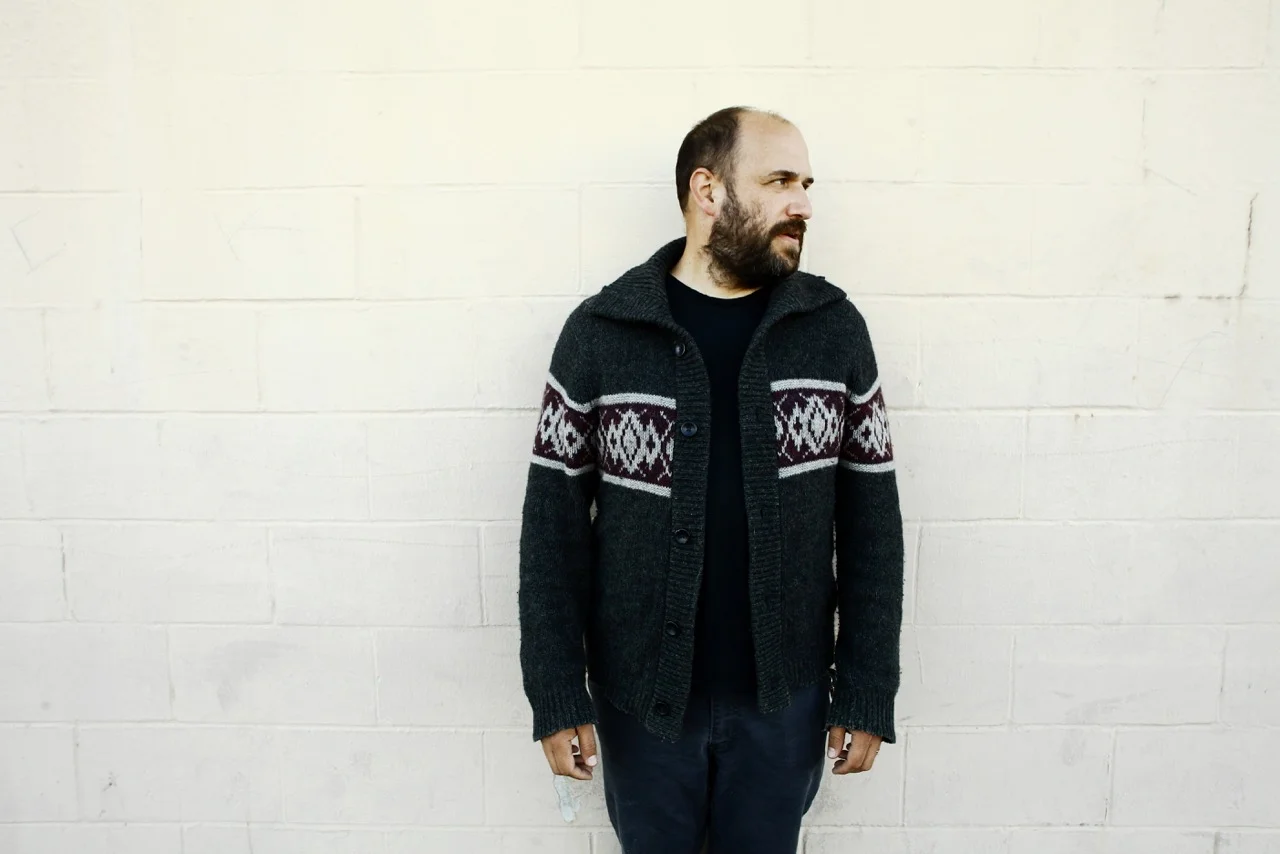Paul Griffiths: San Francisco Folk-Rock Troubadour
The year I arrived for a publishing job that I would walk to while sipping my North Beach coffee, someone had been establishing himself after leaving a teaching job in Bankok. He arrived in '95 the man from Manchester, England, and strolled Haight Street with a guitar strapped to his back, or so I imagined. His name was Paul Griffiths.
"Actually, I confess I never did that." says Griffiths. "It was Mission street, I played guitar a little bit and was in a Pat Benatar cover band named Pat. I dressed as the SNL character, Pat."
Whatever. This frivolous entree into the San Francisco scene was a warm up act. Because during the years that would follow, Paul Griffiths, would become more dedicated to his craft. His work evolved to include more personal songs. Paul Griffiths is still playing local clubs around the Bay Area today. Busier than ever, Paul seemingly never tires of writing and performing new songs, having composed hundreds. He is part of a cherished but vanishing breed: the San Francisco folk-rock troubadour.
Before coming to the states, Paul Griffiths had been a part of several bands and listened intently to the most American of singer songwriters and alt-country folkies. Further, in his travels to Bankok, he met the woman he would marry, a Bay Area native. While the Bay Area was getting ample attention from acts such as John Wesley Harding, Elvis Costello and Lloyd Cole, the musical result of Griffiths slightly tips the hat to that lot but gives a more traditional folk and country emphasis and a more earnest story. There is the resonance of a song’s refrain with only enough irony to tell the story rather than knock it down. In this way I recall the songwriting of John Prine or Billy Bragg and a little Richard Thompson. In a sentence, he lets the song unfold as a story and leaves the editorial for the newspaper.
The song “You Arrived Just in Time” is a good example of the way Paul paints a cinematic picture with a love story leans into bitterness but retreats into an intimate picture. One could fill in his or her own details of passion redux after a bad break up. He may keep a song like this simple, but as in the song’s plot, there’s a lot to hold on to.
“Lyrically it’s inspired by Steve Earle,” says Paul. “I can’t say it’s about a particular incident but a kind of longing. I wanted some ambiguity and danger in there. I played it, I sort of liked it, others had a great reaction.“
The song was first on a compilation of local music called, Songs From the Fog (http://www.western-independent.com/fogsongs/) , and when I hear it, it feels timeless relative to the folk-rock spectrum.
But while on this song there is an element of having to do a little guesswork, other songs are straight forward and earnest. He is there to tell you a story. He takes good care of his listeners and typically does not trick them or bend the song.
Paul wrote “Cap in Hand” to address the history of post-World-War-II Britain and the betrayal of its people they thought they would be heroes but "we found the war tore down the social system that was in place after 1945."
In another song Griffiths starts, “Love can kill slowly with a kiss at a time…with a pinch and a punch and a passionate cry.” If my literal reading of "The Last Drop" is correct, it is in fact (and not figuratively) about a “cold blooded killer on a London highway," of the female persuasion. It is quite chilling and memorable. https://www.youtube.com/watch?v=NFYF7Y6gxkM&index=2&list=PLXnXlJtR-o2JEKdRh8Sf6SSAFIudZbGsv
“Charlie Ice” poses a lyrical tongue twister in a cautionary tale about an angry ranting tweeting paranoid character. Perhaps you have met a few on line. It brings the British invasion power chords to an infectious lyric sheet.
Traditional country music shines through the British accent and sometimes Paul Griffiths goes all out. You learn more about his songwriting approach by listening to Paul’s amazing version of Roy Acuff’s classic Wreck on the Highway. “The Mecons did that song. John Langford is good – from the Waco Brothers. I like that approach: the whole punk-country thing. So I play it acoustic and put an English accent on it.”
Paul is often accompanied by a drummer and a violinist as well as his stand-up bass player. “Meredith Edgar just moved back from Austin, Texas, and we started doing a few shows together. Sometimes I play banjo on her songs too.” He plays in a Pogues cover band as well: The Bogues.
Paul says he got plenty of inspiration to perform early on before he could adequately appreciate it. “I came from an old school musical family. My dad was a good singer. My uncle and father would sing together (check). My sister sung ballads. In holidays, there would be a lot of drinking and a lot of singing. As kids, we used to make fun of it but we all sang around the piano. We either learned the piano ourselves or other instruments. Now they’ve all passed on.”
In Paul Griffith’s “Song for My Dad,” he wistfully and magically looks at the old man of his dreams. In that song he refers to his dad’s singing.
I asked him to relay some of the songs he remembered around the house.
“There’s a really good song my uncle used to sing by Bing Crosby called “The Whiffenpoof Song.” Apparently it is a song still sung in Yale. It’s based on a Rudyard Kipling poem. And one of my aunts was Scottish. She would sing “Flower of Scotland” and other patriotic songs. Also, I remember hearing “Brother could you spare a dime?”
Griffiths was playing gigs here and there while penning songs but more recently he had a breakthrough and followed through on a goal of writing one hundred songs in a year.
“I started doing this workshop with (songwriter) Jim Bruno at the Freight and Salvage (in Berkeley).”
Jim Bruno, who Paul deems one of the great ones in the Bay, was originally from Illinois. He had ways of drawing songs out of his workshop students. He imposed a deadline and challenged them to set a number goal and tackle it.
“I had always been writing songs but I got on this mission where I would write 100 songs. That was 2008 or 9,”
“I wrote a hundred and kind of kept going,” said Griffiths. I have probably written something like 200 songs.”
Griffiths has independent “moments of inspiration” but believes the outside deadlines are useful.
“Now, I try to play a new song for every show I do. That is a way to force me to finish things.”
Of those songs, Griffiths plays about thirty of them regularly in his shows. But he has archived virtually each song. “I keep a record of my best songs and I have some on my iPhone. Some are written and some are recorded. “
I asked Paul Griffiths what he can do as a musician now that he couldn’t do when he was 25.
“I can present my songs without feeling humiliated,” he says, half in jest. “Took me a long time to realize there are all these opportunities. The Bay Area is so welcoming…. I am not critical of my songs. I am just more confident….now I can always lean back and rely on a body of songs that are good quality.”
Griffiths has even written songs based on history and at least one based on contemporary literature. He wrote a song about a short story by our mutual friend Peter Orner called “Last Car Over the Sagamore Bridge.” The story involves a semi-fictional character named Walter, grandfather of the author, who avoided tragedy by crossing a bridge in Sagamore, Mass.
“About five years ago, I met Peter. I met him through Charlie’s Coffee Shop [in Precita Park, a neighborhood in San Francisco]. Peter started talking about organizing events at the café. Peter would do some readings and I would play. Then I did a songwriting workshop and one assignment was to write a song about a bridge so it was almost like a challenge. And I had been reading peter’s book, Last Car Over the Sagamore Bridge.” https://read.amazon.com/kp/embed?asin=B00A2DZIQ6&preview=newtab&linkCode=kpe&ref_=cm_sw_r_kb_dp_bplOyb6TJHFZ7
The result feels very influenced by American folkies like Steve Goodman or Arlo Guthrie and the story is merged with the music in a very natural way.
I ask Griffiths what it is like to be a working regional musician serving a metropolitan area. At the time I interviewed him he had played the above event at Charlie’s Coffee House and also played about 14 of his songs at Bird and Beckett, a great indy bookstore in Glen Park, SF. He at The Lost Church. The Monkey House in Berkeley. The Lucky Horse Shoe in Bernal Heights, SF.
“Well, the community is great (There! Silvie Simmons just walked by – she wrote the Leonard Cohen bio https://www.amazon.com/Im-Your-Man-Leonard-Cohen/dp/0061995002 ). I have some really nice events. People are very supportive. The venues are nice. [They] really takes care of me. There’s lots of amazing songwriters out there really.
Paul mentions that while there are many great ones, a few of his favorites songwriters in the Bay right now include: Maurice Tani, Meredith Edgar, Aireene Espiritu, Gayle Lynn (Schmitt and the Hired Hands), Jeff Desira and the aforementioned Jim Bruno.
Sean Silverman (bass), Benito Cortez (violin) and Randy Lee Odell (drums) often accompany Paul in his shows.
I ask whether he ever understood his role more as a healer, helping people forget something difficult. Say after a regional tragedy or just keeping people a little warmer during a coldsnap.
“After the election, there was a thing at Charlie’s and the last thing I wanted to do was set up my PA but people really wanted to be out there mixing with other people. Sometimes I think it’s all about me, and that is pressure. As soon as you are playing a song you realize it’s an opportunity for others to come out and relax. I am just there playing.”
His moments of doubt, during tough political times are answered in the writing of more songs. “Sometimes I would be saying, ‘what’s this all l about’ and Bob Dylan said, ‘There’s enough songs in the world.’
“Yeah, but there’s always room for more.”
-----------------------
Paul Griffiths plays February 23, 2017 at The Lost Church in SAN FRANCISCO.
For more information, go to http://www.paulgriffithsmusic.com








